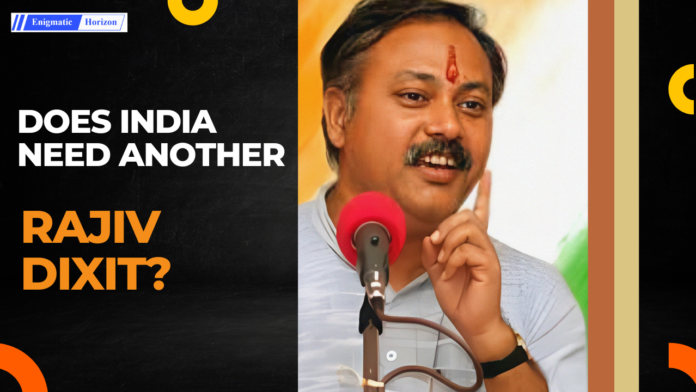Priyal Dholakia (Assistant Editor)
When it comes to medicine, India is home to an infinite repository of ancient knowledge and wisdom. Ayurveda, the oldest and most holistic medicinal system in the world, has its roots in Indian culture. It is said that its early origins date back as far as five thousand years ago. Ayurveda emphasises the use of natural herbs, oils, and spices to treat and prevent diseases. It prioritises a person’s overall well-being rather than only treating the symptoms of a disease. Despite its efficacy, however, Ayurveda is facing tough competition from Western medicine, which is seen as modern, scientific, and more effective. This is where the need for another Rajiv Dixit comes in.
Rajiv Dixit was a social activist and a leading voice in the Swadeshi movement. He led the movement to promote Indian goods and services. He was a strong supporter of Ayurveda and traditional Indian medicine. He worked hard to promote these methods and change India’s healthcare system.
Importance of Ayurveda
Ayurveda has a lot to offer in terms of preventive and curative medicine. Rather than focusing primarily on disease symptoms, it treats the patient as a whole. It emphasizes the importance of a balanced diet, regular exercise, and a healthy lifestyle. In addition to physical health, it also values mental and emotional fitness. Ayurveda encourages the practice of meditation, yoga, and other techniques to promote mental and emotional balance.
Despite its many advantages, Ayurveda is slowly losing ground to Western medicine, even in India. This is partly due to the influence of Western culture and the belief that Western medicine is more modern and scientific. But it is also due to the fact that ayurvedic medicines are not always easily available and that there is a lack of standardization and regulation in the ayurvedic industry.
Revival of Ayurveda by Rajiv Dixit
Rajiv Dixit recognized these challenges and worked to address them. He believed strongly in the goals of the Swadeshi movement. This included increasing awareness of Ayurvedic treatment and other Indian products. He also worked to reform India’s healthcare system, calling for greater regulation and standardization of the Ayurvedic industry. He believed that if Ayurveda was properly regulated and standardized, it could compete with Western medicine on equal terms.
Rajiv Dixit’s efforts to revive Ayurveda and reform the healthcare system were not limited to advocacy. He also worked to develop and promote Ayurvedic medicines and treatments. He founded the Azadi Bachao Andolan, which aimed to promote indigenous Indian knowledge and traditions. He also developed a range of Ayurvedic medicines and treatments, which he promoted through workshops, seminars, and other events.
Despite his efforts, however, Rajiv Dixit faced significant challenges in his quest to promote Ayurveda and traditional Indian medicine. He faced opposition from vested interests in the pharmaceutical industry, who saw Ayurveda as a threat to their profits. He also faced criticism from some quarters, who saw his promotion of Ayurveda as an attempt to turn back the clock and reject modernity.
Rajiv Dixit’s Continuing Legacy
Despite these challenges, Rajiv Dixit’s legacy continues to live on. His work has inspired a new generation of social activists and healthcare professionals to take up the cause of Ayurveda and traditional Indian medicine. There is a growing awareness of the benefits of these systems and a recognition of the need to preserve and promote them.
Today, more and more people in India are suffering from chronic diseases such as diabetes, heart disease, and cancer. Depression and anxiety are also on the rise, especially among young people. The healthcare system is struggling to cope with these challenges, with Western medicine often failing to provide effective solutions.
It is clear that a change needs to take place. We need to bring about a revolution in healthcare, one that revives our traditional holistic medicine and healthcare systems. This is where the role of another Rajiv Dixit comes in. We need someone who can inspire and lead a generation to reinstill faith in Ayurveda and promote traditional Indian medicine to reform our healthcare system. We need someone who can bridge the gap between traditional and modern medicine and bring together the best of both worlds. Only then can we provide effective solutions to our impending health challenges.
